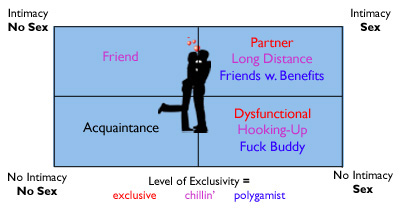If you’ve got kids (or even grandkids) who are from middle school through college age, you’ve heard the term “friends with benefits.” If you haven’t, you should have. Here’s one translation …
The first question about “friends with benefits” is: Why is there so much interest in this topic?
I remember when the idea was first introduced to me in middle school and it seemed like it was the end of society because kids were ‘hooking-up’ (sexual activity) without dating or being in any type of relationship. Now, I’m beginning to understand why there is so much interest in friends with benefits, and why some people think it’s dangerous.
We live in a monogamous society. In Chicago, if you’re not married by 30, people begin to notice. In New York, that age might be 40 but people are still getting married. “Friends with benefits” doesn’t fit. With that said, lets define it.
“Friends with benefits” is a remarkably complex relationship that is generally misclassified as a “fuck-buddy” or a “hook-up”. “Fuck buddies” enjoy having sex with each other but aren’t intimate (as in they aren’t very close friends) while “hook-ups” are a general term referring to any sexual relationship that is less intimate than a dating relationship. Generally, a “hook-up” is unsustainable. It will eventually settle into a “partner” (exclusive relationship with high sexual attraction and intimacy), or a “fuck buddy”, a dysfunctional relationship or “friends with benefits”.
Just as a hook-up relationship is unsustainable, so is a long distance relationship, which, generally, will either become a “partnership” when the two live close by again, or a “hook-up” in which the two people have sex when they’re in the same area, but aren’t generally in the same area. Of course, it could also become a “friends with benefits” relationship. In fact, it might be one of the only ways a “friends with benefits” relationship exists in a sustainable way.
The thing is, “friends with benefits” is rare because it exists in a culture that isn’t monogamous. How can two people that are intimate, sexually attracted to each other and live near each other have a sustainable relationship that isn’t exclusive?
That is the non-monogamous (polygamous?) culture that the mainstream has not embraced either because it finds the idea so morally repulsive it cannot ‘endorse’ it or because, by nature, humans can’t have happy, sustainable, polygamous relationships. I’m not a sociologist so I have no idea what the answer to that question is.
For all you parents out there, I’ll summarize really quickly how this applies to your kids:
If you have a son or daughter in high school or younger, and they’re having a relationship that doesn’t seem very intimate to you, then they’re probably hooking-up for sexual experience, or they’re doing the relationship thing on the down-low (dl) meaning AIM, text messaging, etc. Either way, it’s probably not defined as a “friends with benefits” relationship. Someone always wants more intimacy (usually the girl), and that person will either get what they want and be in a partnership or they won’t, and they’ll stop hooking-up with the other person.
What you, as a parent, should be most worried about is that the relationship devolves into a dysfunctional partnership that’s motivated more by sex, power or safety than intimacy. The worst option is that your son or daughter becomes hung up on this girl/guy that they’re hooking-up with who promises to eventually escalate the relationship into a “partnership” while, in fact, she/he’s really just manipulating the situation to have sex without exclusivity.
Let me just say, I’m all for sex without exclusivity, but when one person is being intentionally lied to by the other (directly or indirectly) that’s how a lot of people get hurt and, then, they go on to not trust (or hurt) other people and the cycle of damaged emotions continues and spreads.
In college, it’s more or less the same but external variables change the game a bit.
In conclusion: the idea of “friends with benefits” is an illusion for most relationships. Generally, it’s either about sex, in which case the friendship part doesn’t exist; or it’s about intimacy, in which case society and culture seem to prefer (or demand) that it be exclusive.


